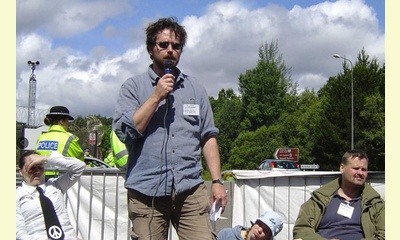|
|
Inaugural Professor for Peace at UMass Amherst(US)
un articulo por Website of University of Massachusetts
Stellan Vinthagen, an internationally known Swedish peace activist
and educator in conflict transformation and civil disobedience, has
been named the inaugural holder of an endowed chair in the study
of nonviolent direct action and civil resistance. The impact of this
appointment will reach well beyond campus. Vinthagen will aim to
create new science-based interdisciplinary knowledge on how and
when nonviolent approaches can resolve conflicts and promote
harmony.

Stellan Vinthagen speaks in 2007 during the original “academic conference blockade” conducted at the British nuclear submarine base in Faslane, Scotland. Vinthagen took the initiative, chaired and organized the conference on nuclear weapons and social science.
click on photo to enlarge
A $2.8 million endowment from a family, who are committed to the
cause of social justice and wish to remain anonymous, will fund
Vinthagen’s position and related activities. Endowed chairs provide
salaries, graduate assistantships and discretionary funding for
research initiatives.
As part of his work, Vinthagen proposes that UMass Amherst
publish a comprehensive annual report on direct, nonviolent actions
similar to reports describing trends of violent conflicts and wars.
“The key is to develop practical and critical knowledge and
guidelines that will facilitate more effective struggles against
injustices and domination, in the U.S. and around in the world,”
Vinthagen said. UMass Amherst Chancellor Kumble R. Subbaswamy
noted, “The appointment of Dr. Vinthagen is perfectly aligned with
the flagship campus’s long history as a force for social justice. Dr.
Vinthagen’s work is at the forefront of an emerging field of study
and his appointment will enrich our campus immeasurably.”
In his new role, Vinthagen will teach, meet with activists from
around the globe and convene gatherings in Amherst. Vinthagen
said, “People around the world aspire to secure human rights and
democratization, but in mass actions, outcomes are mixed. There
must be systematic study so people can learn from mistakes. Now,
with this effort, we can have tighter collaborations among activists
and scholars and those who have decades of experience in places
like South Africa and Egypt. And we can provide a safe place where
people can step back and reflect.”
Vinthagen, who will be a professor of sociology, will also become an
integral member of the Psychology of Peace and Violence Program,
and he will lead the program’s expansion to address issues of
nonviolent action and civil resistance.
(Thank you to Leo Sandy for calling our attention to this article.)
|








|
DISCUSSION
Pregunta(s) relacionada(s) al artículo :
Does research show that nonviolence works?,
* * * * *
Comentario más reciente:
:
Did the writings on nonviolence by Gene Sharp help inspire the movements of the Arab Spring in Egypt and elsewhere?
This is debatable. The New York Times said "yes" and some Egyptians, for example, the blogger Karim Alrawi say "no".
However, it should be recognized that the ideas of nonviolent resistance have a way of transcending borders and centuries. Nelson Mandela was influenced by Martin Luther King who was influenced in turn by Mahatma Gandhi who was influenced in turn by Henry David Thoreau.
[Note added later: The blog of Karim Alrawi is no longer available on the Internet, but see instead the blog of Hossam El-Hamalawy who says that the Palestinians "have been the major source of inspiration, not Gene Sharp, whose name I first heard in my life only in February after we toppled Mubarak already and whom the clueless NYT moronically gives credit for our uprising."

|
|









